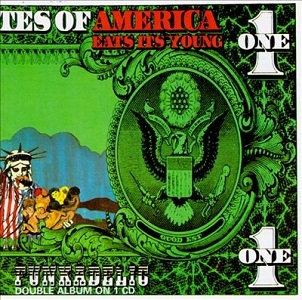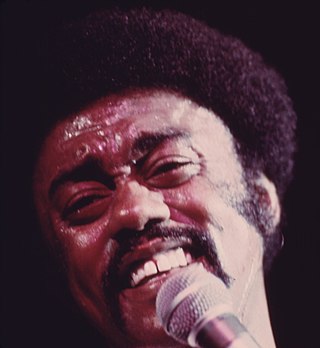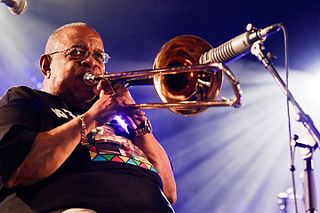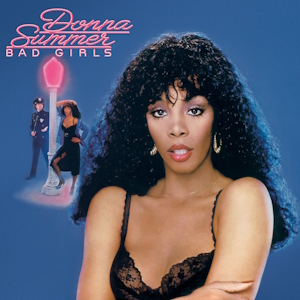
America Eats Its Young is the fourth album by Funkadelic, released in May 1972. This was the first album to include the whole of the House Guests, including Bootsy Collins, Catfish Collins, Chicken Gunnels, Rob McCollough and Kash Waddy. It also features the Plainfield-based band U.S., which consisted of guitarist Garry Shider and bassist Cordell Mosson, on most of the tracks. Unlike previous Funkadelic albums, America Eats Its Young was recorded in Toronto, Ontario, Canada, and in the UK. The original vinyl version contained a poster illustrated by Cathy Abel. The bottom of the poster features the first widespread appearance of the Funkadelic logo, which would appear on the cover of their next album Cosmic Slop.

George Bernard Worrell, Jr. was an American keyboardist and record producer best known as a founding member of the Parliament-Funkadelic collective. In later years, he also worked with acts such as Talking Heads, Bill Laswell, and Jack Bruce. He is a member of the Rock and Roll Hall of Fame, inducted in 1997 with fifteen other members of Parliament-Funkadelic. Worrell was described by journalist Jon Pareles as "the kind of sideman who is as influential as some bandleaders," with his use of synthesizers particularly impactful on funk and hip hop.

Johnnie Harrison Taylor was an American recording artist and songwriter who performed a wide variety of genres, from blues, rhythm and blues, soul, and gospel to pop, doo-wop, and disco. He was initially successful at Stax Records with the number-one R&B hits "Who's Making Love" (1968), "Jody's Got Your Girl and Gone" (1971) and "I Believe in You " (1973), and reached number one on the US pop charts with "Disco Lady" in 1976.

Funkentelechy vs. the Placebo Syndrome is the sixth album by funk band Parliament, released in 1977.

Motor Booty Affair is the seventh album by funk band Parliament. Released on November 20, 1978. It contains two of the group's most popular tracks, "Rumpofsteelskin" and "Aqua Boogie " which went to number one on the Billboard Soul Singles chart.

The J.B.'s was the name of James Brown's band from 1970 through the early 1980s. On records the band was sometimes billed under alternate names such as Fred Wesley and the JBs, The James Brown Soul Train, Maceo and the Macks, A.A.B.B., Fred Wesley and the New JBs, The First Family, and The Last Word. In addition to backing Brown, the J.B.'s played behind Bobby Byrd, Lyn Collins, and other singers associated with the James Brown Revue, and performed and recorded as a self-contained group. In 2015, they were nominated for induction into the Rock and Roll Hall of Fame but failed to be inducted and can be considered for Musical Excellence in the future. They have been eligible since 1995.

"Flash Light" is a song by funk band Parliament, written by George Clinton, Bernie Worrell, and Bootsy Collins and released in January 28, 1978 on the album Funkentelechy Vs. the Placebo Syndrome. It was the first #1 R&B hit by any of the P-Funk groups and spent four months on the U.S. pop chart, peaking at #16.

Bad Girls is the seventh studio album by American singer-songwriter Donna Summer. It was released on April 25, 1979, by Casablanca Records. Originally issued as a double album, Bad Girls became the best-selling and most critically acclaimed album of Summer's career. It was also her final studio album for Casablanca Records. In 2003, Universal Music re-issued Bad Girls as a digitally remastered and expanded deluxe edition.

Silk Degrees is the seventh solo album by Boz Scaggs, released on Columbia Records in February 1976. The album peaked at No. 2 and spent 115 weeks on the Billboard 200. It has been certified five times platinum by the RIAA and remains Scaggs's best selling album.

"Disco Lady" is a 1976 single by American singer Johnnie Taylor that went on to become his biggest hit. It spent all four weeks of April 1976 at No. 1 on the Billboard Hot 100 and six weeks atop the Billboard R&B chart in the U.S. It was also the first single to be certified platinum by the RIAA; ultimately it sold over 2.5 million copies. Billboard ranked it as the No. 3 song for 1976; Cash Box had it the year's No. 1 song
Harvey Scales was an American R&B and soul singer, songwriter, and producer. Scales had been active in the music industry since the 1960s, and composed songs for groups such as The Dells, The Dramatics, and The O'Jays. He is particularly notable for his co-authorship of the songs "Love-Itis" and "Disco Lady". Once called Milwaukee's "Godfather of Soul" by a local reporter, Scales credited James Brown and the sound of "funk" for influencing his music career.

"The Bitch Is Back" is a rock song written by English musician Elton John and songwriter Bernie Taupin, and performed by John. It was the second single released from John's 1974 album Caribou, and reached number 1 in Canada, number 4 in the United States and number 15 in the United Kingdom.

Funk or Walk is the debut album by the Brides of Funkenstein, released on Atlantic Records in September 1978. The album was produced by George Clinton with the exception of the album's first single "Disco To Go" which was written and produced by Clinton and Bootsy Collins. The Brides of Funkenstein consisted of Lynn Mabry and Dawn Silva, who were members of Sly and the Family Stone prior to joining P-Funk. Funk Or Walk earned Mabry and Silva a Record World Award for Best New Female Artists and Best New R&B Group in 1979. The song was originally performed live by Bootsy's Rubber Band. To this day, the P-Funk All Stars continue to play "Disco To Go" in their live concerts. The Brides of Funkenstein also toured and recorded with Parliament/Funkadelic around this same time.

This Boot Is Made for Fonk-N is the fourth album by the American funk band Bootsy's Rubber Band. It was released through Warner Bros. Records on June 1, 1979. Unlike previous albums by Bootsy's Rubber Band, this album did not generate any hit singles. The album was more experimental in nature than previous efforts. It would also mark the last time that the name "Bootsy's Rubber Band" would be used on a Bootsy Collins related project until the 1982 12" single release "Body Slam". This Boot Is Made For Fonk-N peaked at number 9 on the Billboard Top R&B/Hip-Hop Albums chart and number 52 on the Billboard 200 album chart.

Blacktronic Science is the third solo album by the former Parliament-Funkadelic keyboardist Bernie Worrell. The album was released by Gramavision Records in 1993.
"Who's Making Love" is a song written by Stax Records staffers Homer Banks, Bettye Crutcher, Don Davis and Raymond Jackson and recorded by singer Johnnie Taylor in 1968.

The Third Power is a 1991 album by the New York based music group Material. The album mixes reggae. funk, dub and rap music.

"Always and Forever" is an R&B song written by Rod Temperton and produced by Barry Blue. It was first recorded by the British-based multinational funk-disco band Heatwave in 1976. Released as a single on December 3, 1977, the song is included on Heatwave's debut album Too Hot to Handle (1976) and has been covered by numerous artists, becoming something of a standard.
Donald Davis was an American record producer, songwriter and guitarist who combined a career in music with one in banking.
This is the discography of American musician Bootsy Collins.
















